King Charles III: From Prince of Wales to the throne
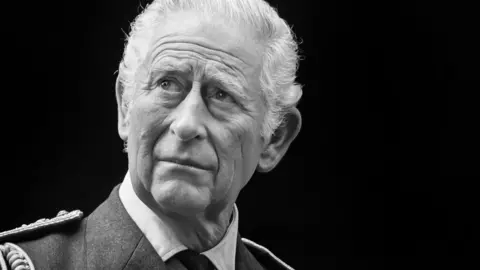 Getty Images
Getty ImagesKing Charles III was a nine-year-old boy when his mother made him Prince of Wales.
He vividly recalls a feeling of acute embarrassment as he sat in his headmaster's study with some friends, where they watched his mother making the announcement on television.
"I intend to create my son, Charles, Prince of Wales, today," she announced in the pre-recorded message played at the end of the 1958 Empire Games in Cardiff.
The speakers boomed: "When he is grown up I will present him to you at Caernarfon."
The crowd cheered an announcement that continued a centuries-old tradition: that the heir to the throne would be known as the Prince of Wales.
The timing would allow the young prince, and the country, to get used to the idea.
In the 1950s Wales was largely comfortable as a member of the United Kingdom, with the sometimes bloody history of the title of Prince of Wales rarely mentioned.
Indeed, the previous holder, who would become Edward VIII, had endeared himself to some in the industrialised valleys.
His attempt to highlight rising unemployment in south Wales in the 1930s led to him being often misquoted as saying: "Something must be done."
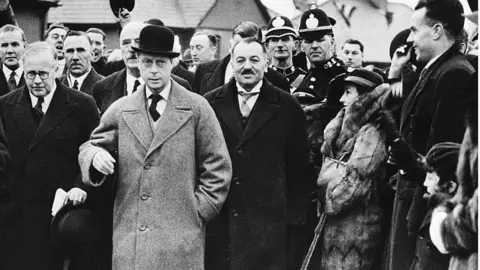 Getty Images
Getty ImagesHis remarks, as recorded by the Western Mail in 1936, were that "something should be done to get them at work again," as he visited the derelict Dowlais Iron and Steel Works near Merthyr Tydfil.
Despite the crisis of the abdication that followed, his overt compassion meant there were many in south Wales who still had a soft spot for the King who abandoned the throne.
By the time of Charles's investiture as Prince of Wales in 1969 the world, and Wales, had changed.
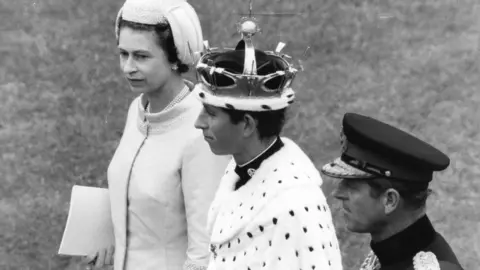
Protests were planned to coincide with the ceremony at Caernarfon Castle, where the choreography was a colourful and largely political concoction to introduce Charles to the world.
It would leave no doubt that he was Prince of Wales and a mature heir to the throne.
Those who opposed the investiture were inspired by the historical overthrow of medieval Welsh princes, the Tywysogion, whose role as leaders of Wales was deleted by conquering English kings.
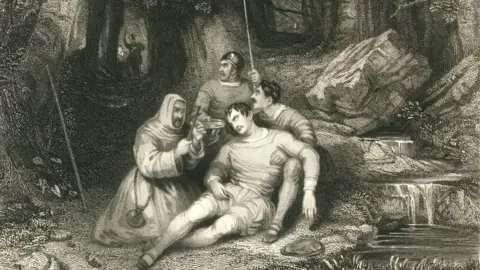 Getty Images
Getty ImagesAfter the killing of Llywelyn ap Gruffudd in 1282 the title Prince of Wales would never again be held by a Welshman.
Although the welcome, far more often than not, was warm, the then Prince Charles encountered occasional bouts of animosity during his period as Prince of Wales.
But as the longest-serving holder of the title, he built a portfolio of connections at organisations that reflect Welsh cultural life.
 Getty Images
Getty ImagesIn July this year, more than 1,500 people lined the high street in Treorchy to welcome Charles and Camilla to the town.
Later that evening, foreign ambassadors joined the Prince at his Welsh home, Llwynywermod, to enjoy performances by students from the Royal Welsh College of Music and Drama and to meet Welsh business people.
Charles enjoyed a busy schedule in Wales, and had commitments which will be hard to give up.
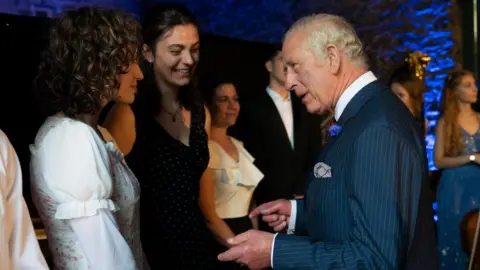 Getty Images
Getty ImagesWhen King Charles III addressed the nation on Friday, his decision to bestow the title of Prince of Wales on his son, William, was greeted with some surprise.
Not because it was unexpected, but because it had happened far sooner than many had predicted.
For those brought up on the tale of Charles's drawn-out path to being Prince of Wales, an assumption had developed that the new King would leave the future of the title for another day.
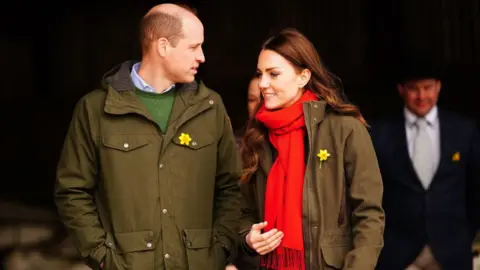 Getty Images
Getty Images"It was unexpected to me. I got quite a shock," said Dr Mari Wiliam, a lecturer in modern history at Bangor University.
Dr Wiliam expected any ceremony for the new Prince of Wales to be far more subdued than the investiture that Charles experienced, if one happens at all.
"There doesn't need to be a ceremony. Many, especially Charles, know the trouble there was in 1969.
"This all depends on the politics of the period. Back in 1911, Lloyd George was desperate to have an investiture in Caernarfon for his own political career, but also to develop Wales' status.
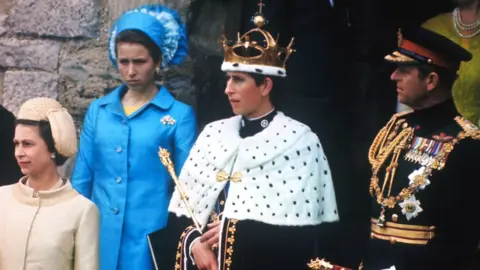 Getty Images
Getty Images"Wales now, because of devolution and the role of the Senedd, is a more mature country than back in those days. So maybe it's not needed."
There was also the question as to whether Buckingham Palace would seek support from the Welsh government for the creation of a new Prince of Wales.
The Welsh Parliament and its government did not exist in 1969, signalling just how much the United Kingdom has changed during the reign of Elizabeth II.
Neither the UK government nor the Palace would confirm if any discussion had happened.
Shortly after the King's speech, First Minster Mark Drakeford said that Wales "looked forward to deepening our relationship with the new Prince and Princess".
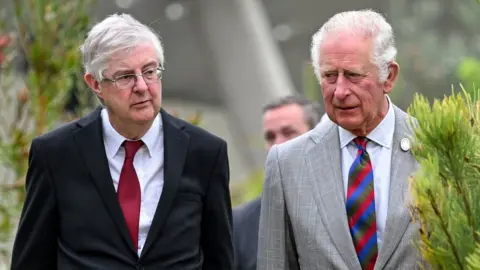 Getty Images
Getty ImagesPlaid Cymru leader Adam Price said "in due course" there should be a public debate "surrounding the title of the Prince of Wales".
A former Plaid leader, Lord Dafydd Elis-Thomas, counted the then Prince Charles as a friend.
On the day of the Queen's death, Lord Elis-Thomas said it was time to end the title Prince of Wales because of its historical symbolism.
But, now that it is clear it will continue, he said he wants things to be different under Prince William.
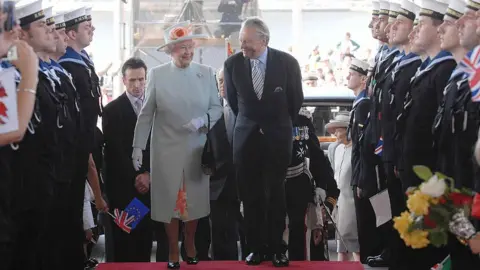 Getty Images
Getty Images"If there is to be a member of the royal family delegated with responsibility for Wales, then we are talking about internal devolution within the monarchy," he explained
"I don't think we have thought through, sufficiently yet, what that could mean and what the opportunities are," Lord Elis-Thomas said, explaining the need to provide them with the "necessary support".
"The great thing about William and Catherine is that they are experienced in living in Wales, and that is important," he added.
An opinion poll of around 1,000 people in 2018 for ITV, by YouGov, found 57% thought Prince William should be given the title Prince of Wales if Prince Charles became King, while 22% thought the title should be abolished.
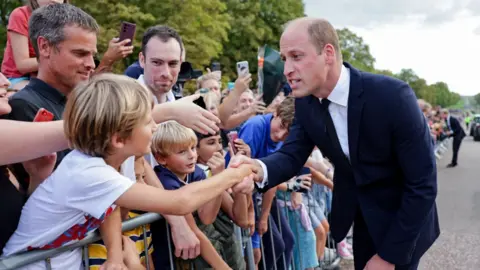 Chris Jackson
Chris JacksonThe figures resembled the findings of a BBC poll in 2009 - of just under 1,000 people - which said that 58% of people believed there should be a new Prince of Wales after Charles took the throne.
Former Welsh secretary, Lord Peter Hain, said: "I have seen his passion for Wales at the Millennium Stadium, cheering on the Welsh rugby team. I have seen him, personally, having enthusiasm for Welsh life and everything that we in Wales are proud of."
He added "William will add enormous value" to the title of Prince of Wales.
"He is globally known, he is young, modern and in touch," Lord Hain said. "I think he will be a great Prince of Wales."
Prince William is now known as Prince of Wales and it will be for him to cultivate a relationship with organisations and charities here.
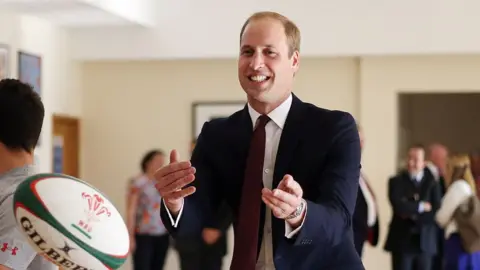 Getty Images
Getty ImagesHe has connections already, of course, having served with the RAF on Anglesey and being patron of the Welsh Rugby Union.
Prince William will encounter both the animosity that faced his father, as well as the warm encouragement that Prince Charles also enjoyed.
And for Princess Catherine, too, there may be some trepidation.
She takes the title Princess of Wales which was so closely linked with William's mother, Princess Diana.
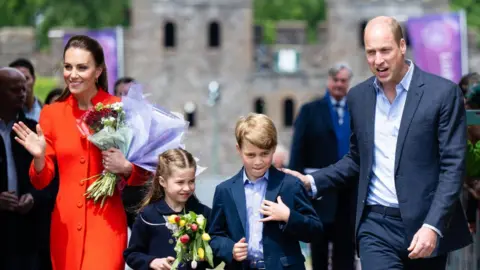 Getty Images
Getty ImagesA royal source said Princess Catherine "appreciates the history" and will "look to the future" as she takes on the role.
King Charles leaves the role of Prince of Wales having forged close working relationships with dozens of charities and organisations, as well as close friendships.
Prince William will need to decide whether he steps in to those roles, or carves out his own path as the latest Prince of Wales.
